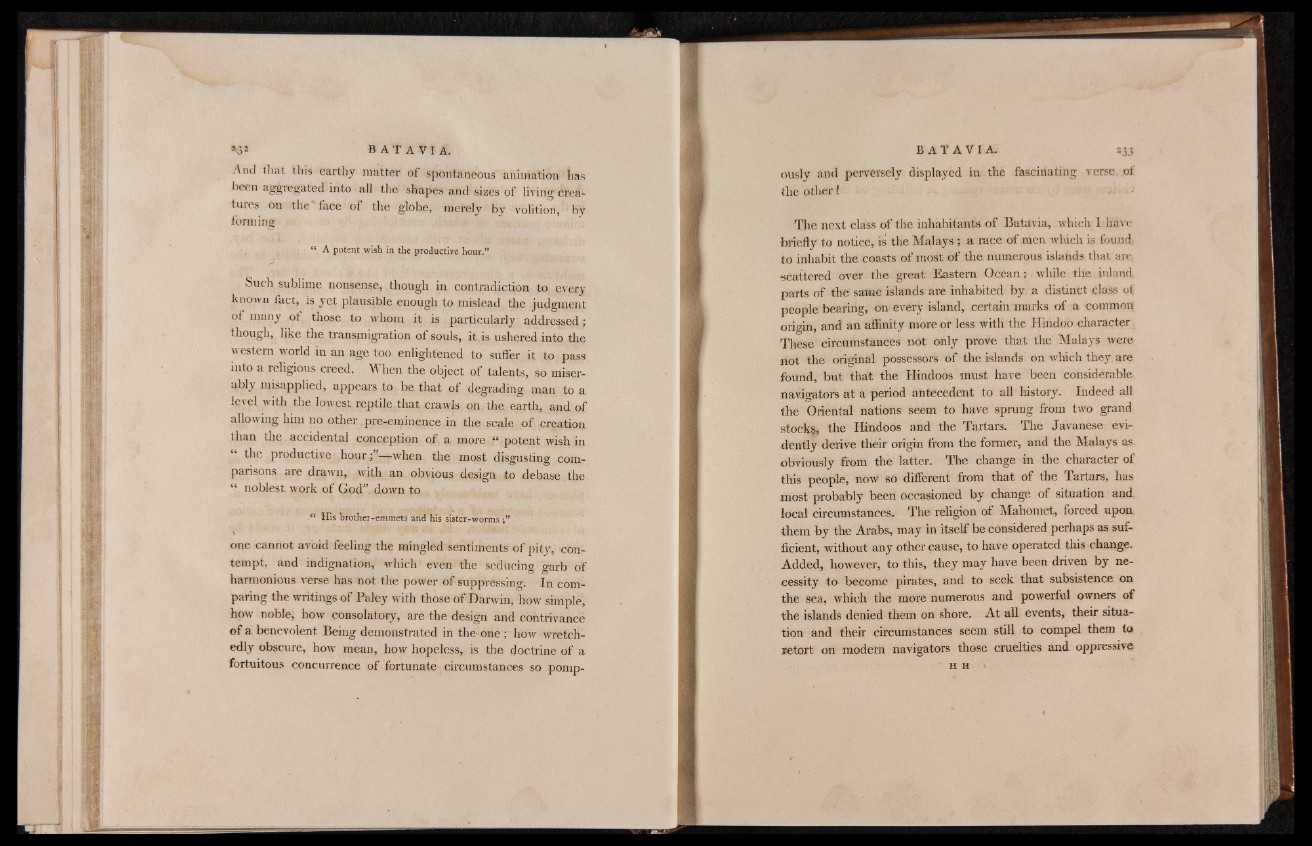
»32 B A T A V I A .
And that this earthy matter of spontaneous animation has
been aggregated into all the shapes and sizes of living creatures
on the" face of the globe, merely by volition, by
forming
“ A potent wish in the productive hour.”
Such sublime nonsense, though in contradiction to every
known fact, is yet plausible enough to mislead the judgment
of many of those to whom it is particularly addressed;
though, like the transmigration of souls, it is ushered into the
western world in an age too enlightened to suffer it to pass
into a religious creed. When the object of talents, So miser-
abljr misapplied, appears to be that of degrading man to a
level with the lowest reptile that crawls on the earth, and of
allowing him no other. pre-eminence in the scale of creation
than the accidental conception of a more “ potent wish in
the productive hour; —when the most disgusting comparisons
are drawn, with an obvious design to debase the
“ noblest work of God” down to
His brother-emmets and Ins sister-worms
one cannot avoid feeling the mingled sentiments of pity, contempt,
and indignation, which even the seducing garb of
harmonious verse has not the power of suppressing. In comparing
the writings of Paley with those of Darwin, how simple,
how noble, how consolatory, are the design and contrivance
of a benevolent Being demonstrated in the o n e h ow wretchedly
obscure, how mean, how hopeless, is the doctrine of a
fortuitous concurrence of fortunate circumstances so pomp-
B A T A V I A . 333
ously and perversely displayed in the fascinating verse of
the other!
The next class of the inhabitants of Batavia, which I have
briefly to notice, is the Malays ; a race of men which is found
to inhabit the coasts of most of the numerous islands that are
scattered over the great Eastern Ocean; while the inland
parts of the same islands are inhabited by a distinct class of
people bearing, on every island, certain marks of a common
origin, and an affinity more or less with the Hindoo character.
These circumstances not only prove that the Malays were
not the original possessors of the islands on which they are
found, but that the Hindoos must have been considerable
navigators at a period antecedent to all history. Indeed all
the Oriental nations seem to have sprung from two grand
stock?, the Hindoos and the Tartars. The Javanese evidently
derive their origin from the former, and the Malays as
obviously from the latter. The change in the character of
this people, now so different from that of the Tartars, has
most probably been occasioned by change of situation and
local circumstances. The religion of Mahomet, forced upon
them by the Arabs, may in itself be considered perhaps as sufficient,
without any other cause, to have operated this change.
Added, however, to this, they may have been driven by necessity
to become pirates, and to seek that subsistence on
the sea, which the more numerous and powerful owners of
the islands denied them on shore. At all events, their situation
and their circumstances seem still to compel them to
retort on modern navigators those cruelties and oppressive
h h ■